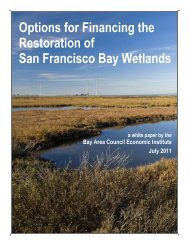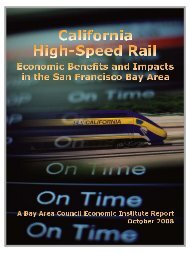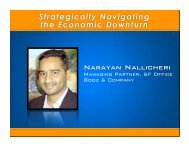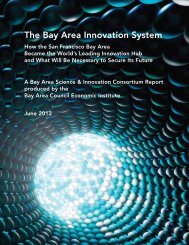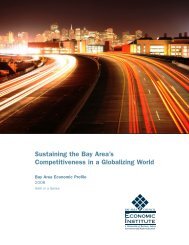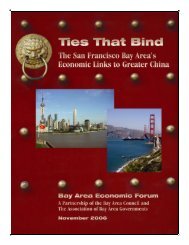PDF: 2962 pages, 5.2 MB - Bay Area Council Economic Institute
PDF: 2962 pages, 5.2 MB - Bay Area Council Economic Institute
PDF: 2962 pages, 5.2 MB - Bay Area Council Economic Institute
You also want an ePaper? Increase the reach of your titles
YUMPU automatically turns print PDFs into web optimized ePapers that Google loves.
Global Reach<br />
A. Privett, S.J, and a January 2007 tour of 18 USF <strong>MB</strong>A students visiting businesses and nonprofit<br />
organizations. During the past three years, 13 USF students have spent a year or a semester<br />
studying abroad in India.<br />
USF’s Center for the Pacific Rim held a “mini-festival” on India in 2007, featuring five public<br />
programs on India, and honored Indian born entrepreneur and Hotmail founder Sabeer Bhatia<br />
at its 20th Anniversary Gala in April 2008.<br />
The Global Social Benefit Incubator (GSBI) in the Center for Science, Technology, and<br />
Society at Santa Clara University has worked with more than forty “social enterprises”<br />
in India to develop innovative business models that enable a new breed of “social<br />
entrepreneurs” to achieve significant scale. One example, a reverse osmosis system that was<br />
serving one million customers two years ago, will be serving more than fifteen million people in<br />
three years. Innovative businesses nurtured at GSBI illustrate how challenging problems like access<br />
to safe water, the productivity of small holder farms, and access to financial services for the<br />
unbanked can be addressed through low-cost solutions. Insights from GSBI's work in India are<br />
attracting growing interest in the possibility of serving the poorest of the poor though user-centered<br />
product, service, and process innovation that radically reduces costs.<br />
The Alumni Conundrum<br />
Global alumni networks can play a vital role in a university’s ability to:<br />
• raise funds and attract endowments;<br />
• provide employment and entrepreneurial networking contacts for graduating students; and<br />
• link with universities, research laboratories, companies and government bodies<br />
worldwide on joint research and collaborative exchanges.<br />
Through its overseas alumni, a university is additionally able to stay current with market and<br />
social trends, leverage complementary work and funding support, and enhance the university’s<br />
overall stature abroad. Alumni organizations often serve as parallel professional networking<br />
organizations, both in the home country and overseas.<br />
UC Berkeley’s estimated 800 alumni living in India, and Stanford’s 400, represent an impressive<br />
resource of talent and connections. Yet the connections between these alumni and their schools<br />
remain relatively weak, especially when compared to the role played by their Chinese counterparts<br />
in cross-border business development and exchanges.<br />
Both universities maintain contact with their India alumni in the context of arranging visits,<br />
hosting industry or public policy conferences, facilitating individual contacts and so on. Neither<br />
school, however, has a distinct Indian alumni group on the order of the Berkeley Chinese<br />
International Alumni Association or the Forum for American/Chinese Exchange at Stanford<br />
(FACES), or a distinct development entity such as the Berkeley China International Association<br />
(although the Stanford Office of Asian Relations does broadly perform such a function for Asia<br />
as a whole, including India).<br />
64



